
WhatsApp Message Template: A How-to Guide with 13 Examples
Businesses can't send WhatsApp messages after 24 hours unless they use WhatsApp Message Template. Learn how to format and send template messages plus examples.

Voice calls remain a vital part of business communication, but with more options available than ever, choosing the right phone system can be a challenging task. Landlines offer reliability, while VoIP (Voice over Internet Protocol) brings flexibility and features. Modern solutions, such as WhatsApp VoIP, add convenience and reach. The best choice depends on your business needs, setup, and customer preferences
This article breaks down the various types of phone systems, their features, pros and cons, and ideal use cases, allowing you to choose the right fit based on your business operations and customer expectations.
Landlines are traditional phone systems that transmit voice communication using physical wired connections. They use copper wires or fiber-optic cables that run underground or on telephone poles to connect homes and businesses to the Public Switched Telephone Network (PSTN).
![Traditional landline phone setup involves cables that connect homes and businesses to the Public Switched Telephone Network (PSTN] and special hardware for business use](https://assets2-proxy.respond.io/ph8r57dk1q9w/2wDwUl77sViuIdHYwMkhHk/3cc17b3e9676a9f9d1847f2ff11904c0/VoIP_v_Landline_v_WA_Business_Calling_-_Image_7.png)
Landlines support all the essentials expected of a phone system. However, because they are analog, advanced features like recording and Interactive Voice Response (IVR) are often difficult to set up and require special hardware.
Landlines have been the bread and butter of phone systems for the past century. They still have a place in the world, but mobile phones and VoIP are overtaking their position.
VoIP is a system for transmitting voice over the Internet. Since VoIP solutions are digital, they can easily record calls, implement features like IVR and provide analytics for performance tracking.
Their digital nature also enables seamless integration with other software, such as Customer Relationship Management (CRM) systems, making updating customer records after conversations convenient.
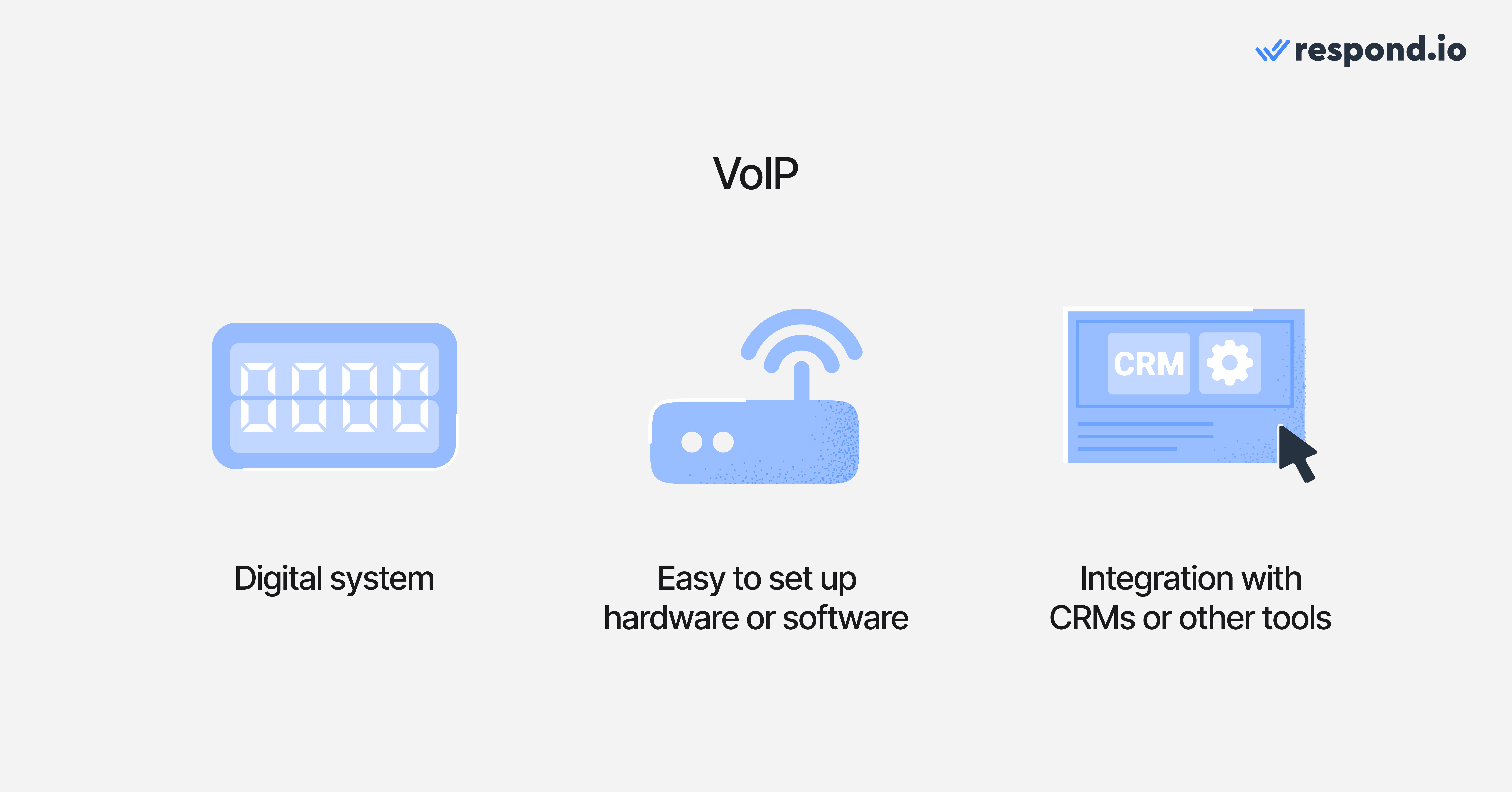
Moreover, if you opt for software solutions instead of hardware-based options like a dedicated VoIP phone, installation can be as simple as downloading an app on your smartphone or laptop—no need for new hardware.
Many popular applications, like Zoom and Viber, now offer free VoIP services for calling other users on the same channel. One such app is WhatsApp, which we’ll cover next.
Although voice calls on the WhatsApp consumer app have been available for years, the ability to make calls through the WhatsApp API is a more recent development. WhatsApp Business Calling API enables VoIP-based voice calls over the internet, giving businesses a flexible and cost-effective way to connect with customers.
While traditional VoIP calls rely on external apps or devices, WhatsApp VoIP allows you to place voice calls within the WhatsApp chat itself so the entire conversation, from message to call, happens in one familiar place.
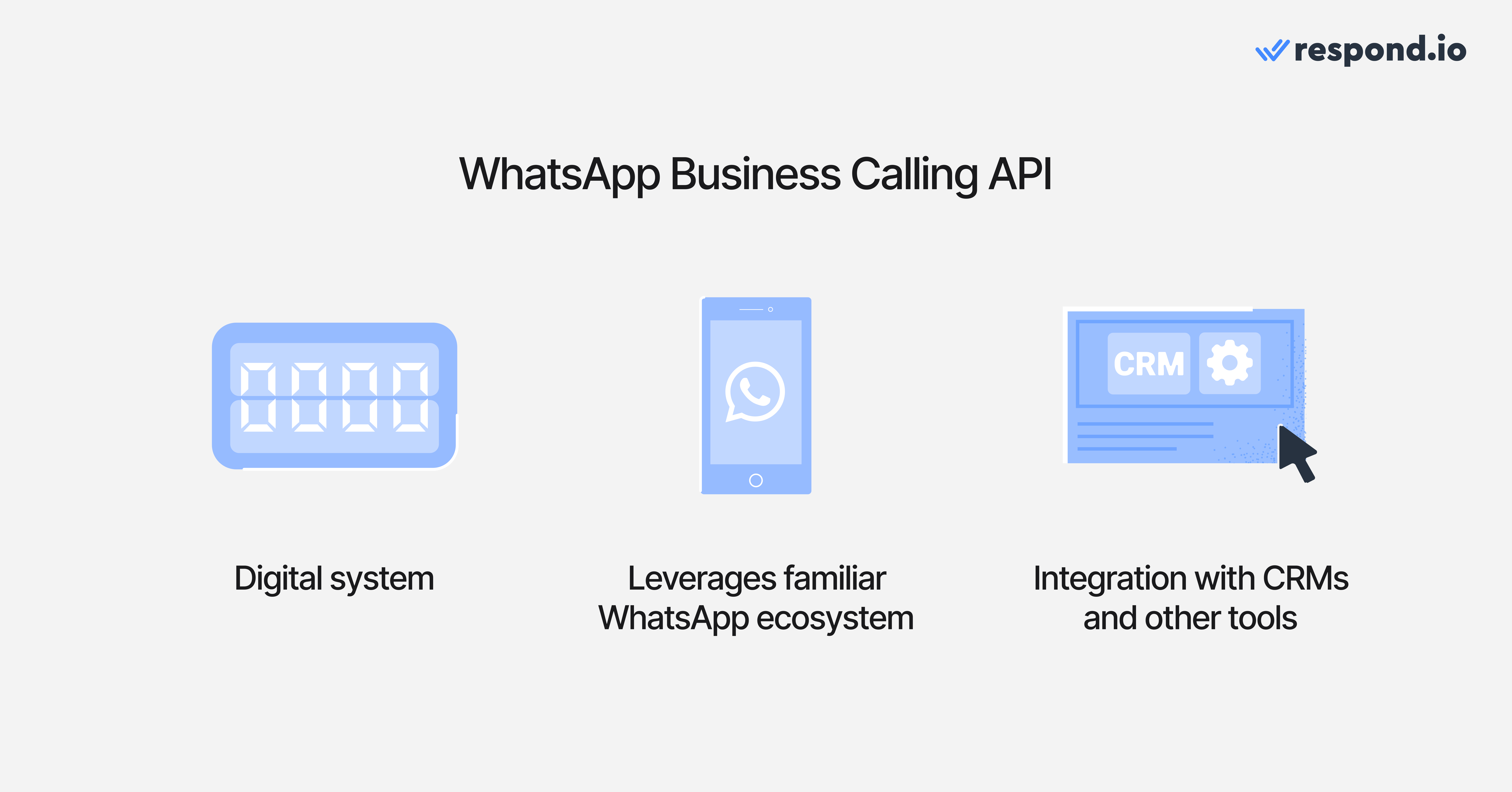
It also retains the core benefits of traditional VoIP, such as the ability to integrate with CRMs and automation tools to streamline workflows and improve performance tracking. Now that we’ve set the stage, how do these different phone systems stack up against each other?
Turn conversations into customers with respond.io's official WhatsApp API ✨
Manage WhatsApp calls and chats in one place!
For most businesses, setting up a phone system involves some cost, whether you're building from scratch or upgrading an existing setup. Let’s go through anticipated costs.

Landlines: Expect to pay more if you don’t have an existing system in place. There will be costs for setting up, installing lines, purchasing phones and more. Service charges are usually by the minute and are significantly costlier for international calls.
VoIP: One of its biggest advantages is cost-effectiveness. As VoIP doesn’t rely on expensive telephone networks, it’s more affordable than landlines, especially if you make frequent international calls.
Service charges vary, with options ranging from subscription-based plans to pay-as-you-go pricing. While some businesses invest in VoIP phones, most can simply install VoIP software on existing devices, further reducing costs.
However, some countries require businesses to obtain licenses, register local addresses, or work with government-approved VoIP providers, which can add extra expenses and time.
WhatsApp Business Calling API: While a WhatsApp Business Platform account is free, it requires a conversation management software like respond.io to communicate with customers. Meta charges per minute for outbond voice calls, with rates depending on the account region. However, inbound voice calls are free.
Getting a phone number for WhatsApp Business Platform is also easy and inexpensive, as SIM cards or virtual numbers are highly affordable in most countries.
These phone systems can make and receive calls, but they also have features that set them apart.
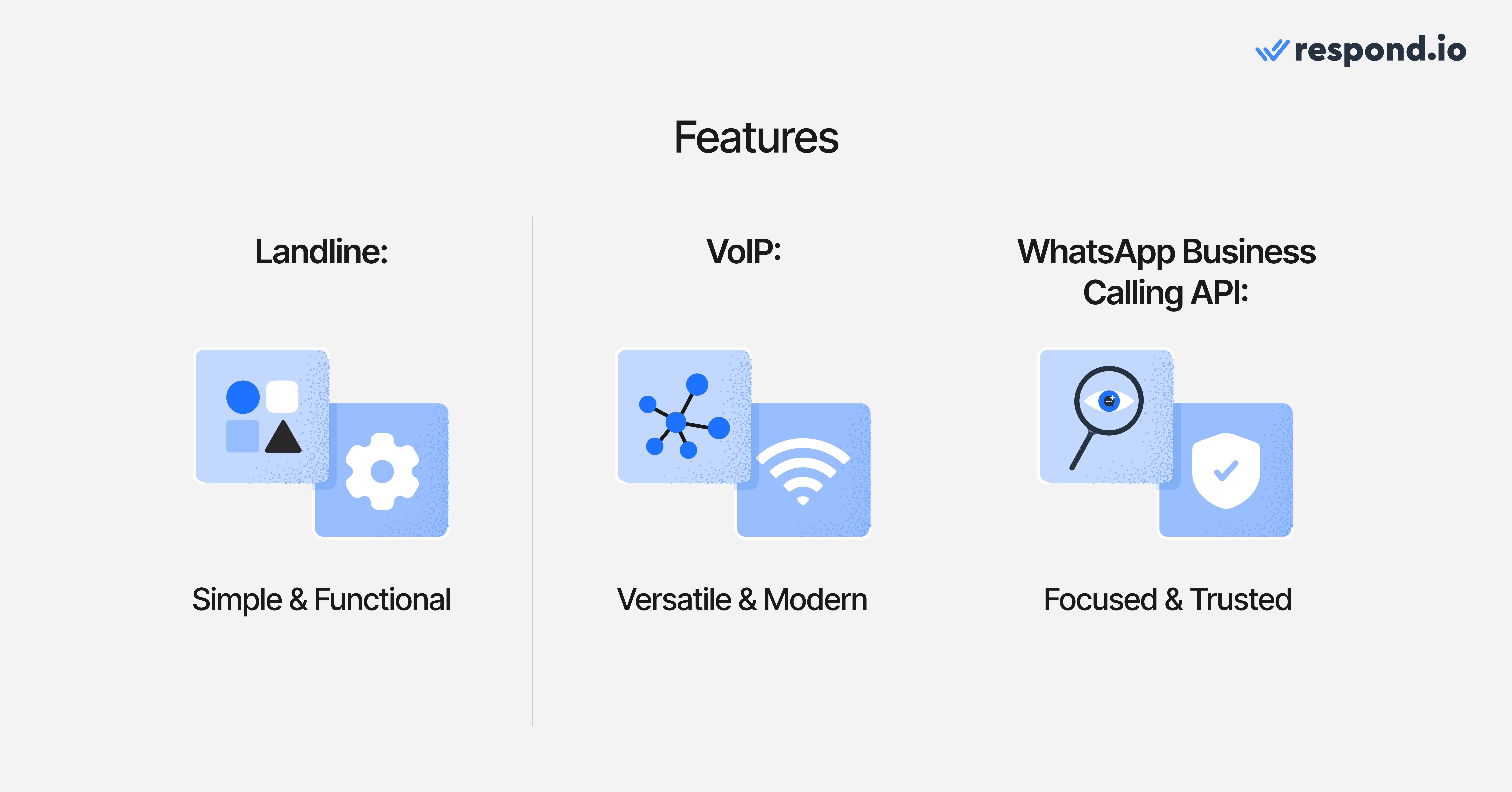
Landlines: They offer all essential voice features, including caller ID and call forwarding. However, setting up advanced functions like automation or integration—where possible—can be complex and often requires additional hardware.
VoIP: This includes all essential features but offers easier automation and integration. It also enables video calls and cost-effective international calling, especially through app-based solutions, which often allow free app-to-app calls.
WhatsApp Business Calling API: The WhatsApp VoIP solution only allows businesses to make calls to opted-in WhatsApp numbers and receive calls exclusively from other WhatsApp users.
However, if WhatsApp is the primary communication channel in your region, this becomes a strong advantage. You’ll be able to switch between texting and calling in the same chat, keeping all interactions in one place. Additionally, customers will be able to verify your authenticity if you have a WhatsApp blue tick, speeding up the trust-building process!
Scalability refers to the ease with which you can expand or adjust your phone system to meet the changing needs of your business as it grows or evolves.
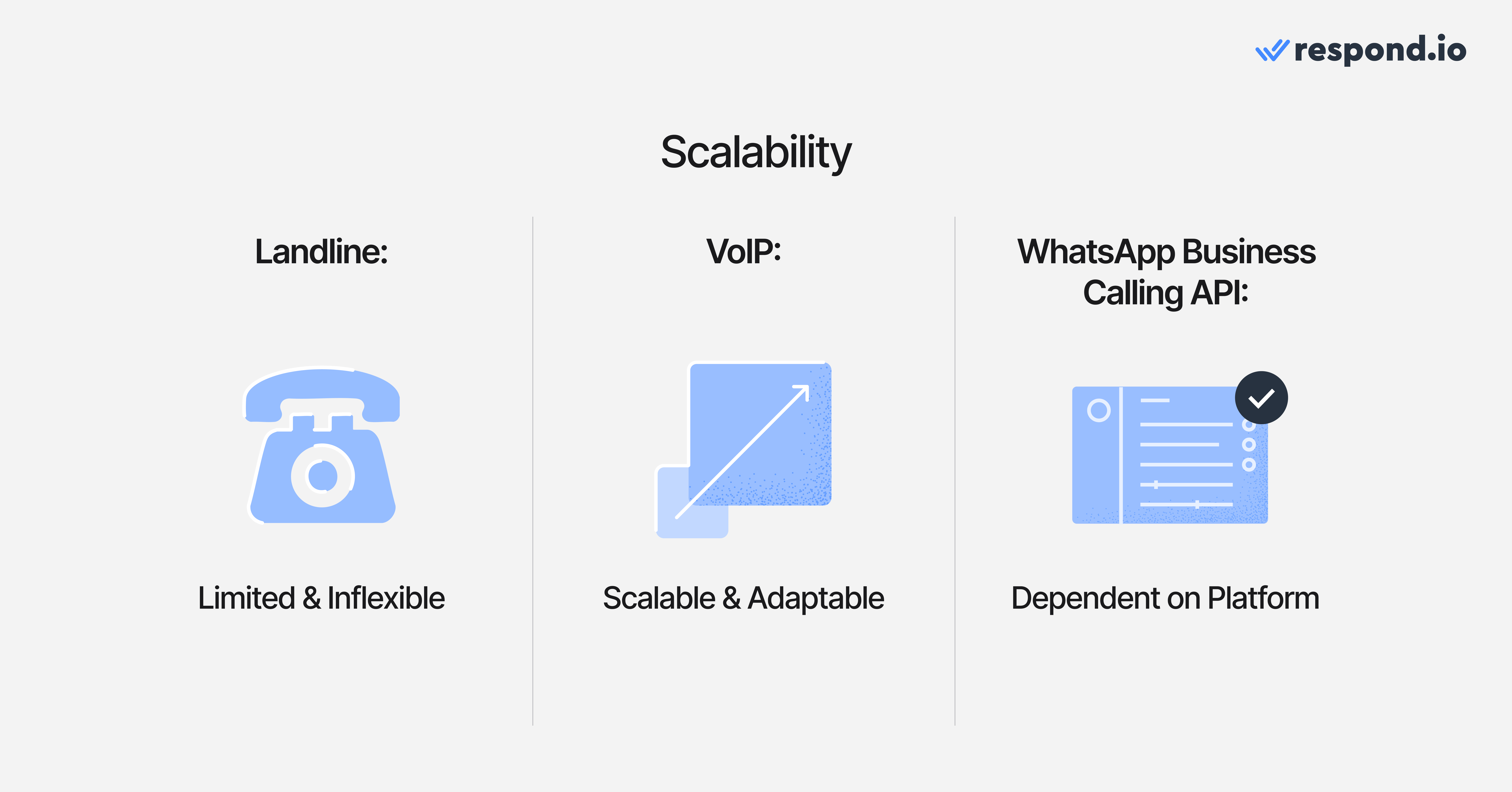
Landlines: Landlines depend on local infrastructure, making them difficult or even impossible to install in some areas. This means limited flexibility and without shared phones, each staff member handling calls will need a dedicated phone and line, which can be impractical for larger teams.
In some countries, businesses may also require government approval or special permits to install landlines, adding regulatory hurdles that can limit expansion.
VoIP: Scalability is simple and virtually unlimited. As long as employees have a laptop or smartphone, they can install VoIP software to handle calls. In noisy offices, headsets or microphones may be needed for better call quality, but these are easy to acquire.
However, in some countries, VoIP expansion is restricted, requiring government approvals, special licenses or partnerships with local telecom providers.
WhatsApp Business Calling API: WhatsApp VoIP is ideal for fast-scaling businesses, especially in emerging markets. Operating within the world’s most popular messaging app, it lets businesses add users, teams or regions without the physical infrastructure, local telco or regulatory hurdles associated with landlines or traditional VoIP.
Scalability depends on the conversation management platform used with the API. For example, respond.io supports five users on the Starter plan, with add-ons and higher tiers for growing teams, making it easy to handle high chat and call volumes.
If your agents are constantly on the go, mobility is an essential factor to consider.
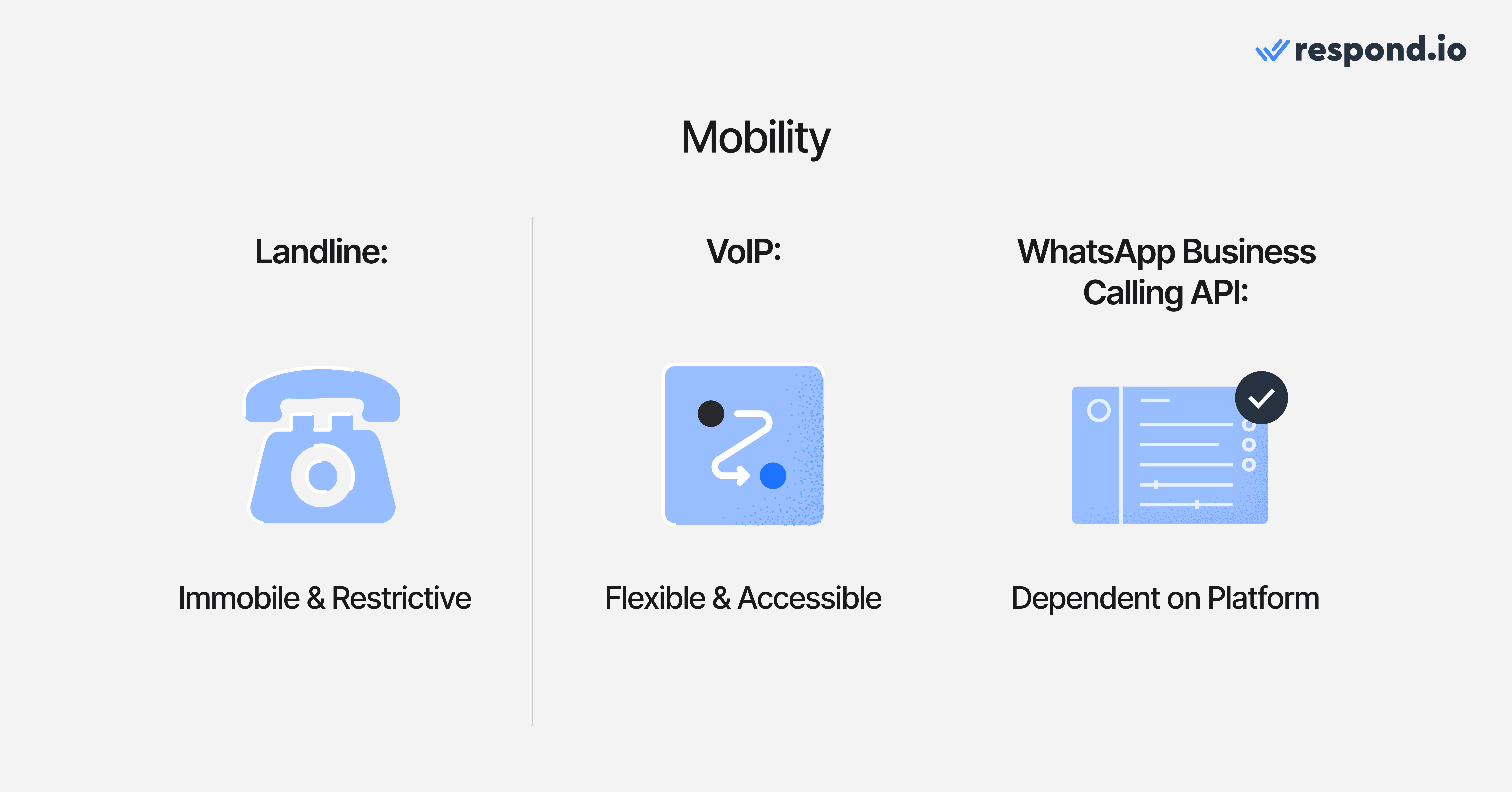
Landlines: These are an immobile solution. You can only make and receive calls from where you have your landline phones set up.
VoIP: Much more flexible than landlines. All you need is a stable internet connection and a computer or smartphone.
WhatsApp Business Calling API: Mobility depends on the conversation management platform you use for WhatsApp Business API. If the platform has a mobile app and supports the WhatsApp VoIP (not all providers do), your agents can take calls from anywhere with internet access.
Picking the right phone system ensures consistent call quality, minimised dropped calls and business continuity across locations, devices and conditions.
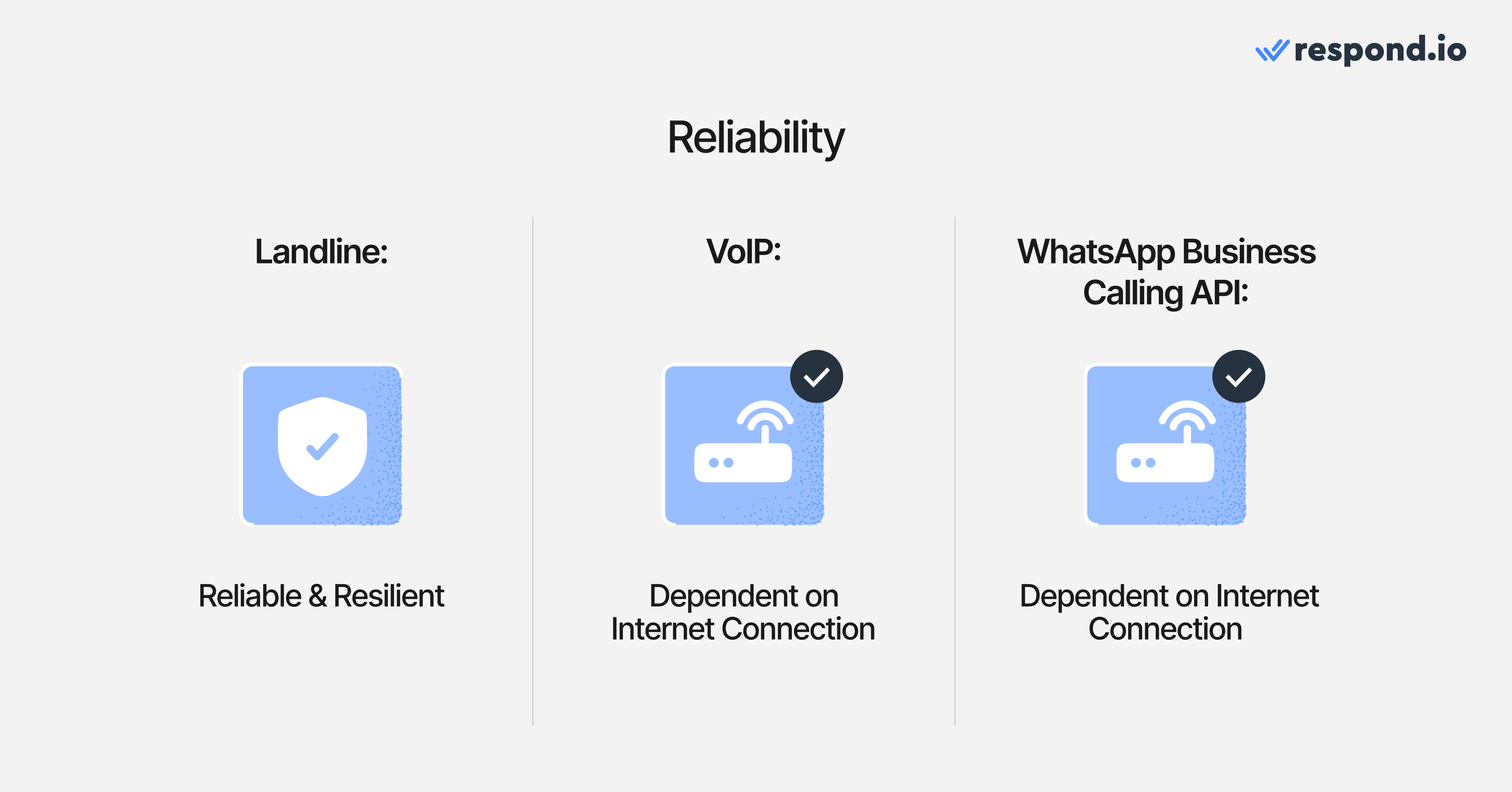
Landlines: Landlines are known for their stability and consistent call quality, especially for local or internal communication. Unlike internet-based systems, they aren’t affected by latency, jitter or packet loss, and are therefore reliable for voice clarity.
They also continue working during power outages, thanks to off-grid power supplies. This makes them particularly useful in industries where communication cannot go down or in regions with frequent blackouts.
However, their reliability is tied to physical infrastructure, which limits mobility and scalability in modern business settings.
VoIP: While it is the most flexible option, it won’t work well without a good internet connection. If the internet is spotty in your area, you won’t be able to get a lot of calls done with VoIP. For offices with poor WiFi coverage, consider WiFi extenders or switching to 4G/LTE/5G networks for data to mitigate this risk.
VoIP systems also tend to be susceptible to power outages since your network hardware won’t have any power to operate unless you make all your calls on devices with cellular connectivity.
WhatsApp Business API: Like traditional VoIP, WhatsApp calling depends on a stable internet connection, but it’s more resilient in real-world use. Because WhatsApp is built for mobile, it works reliably on 4G/5G networks and even lower bandwidth connections, especially on smartphones.
This gives WhatsApp calls an edge in regions where WiFi infrastructure is weak but mobile data coverage is strong. Agents can continue handling calls using mobile devices during power outages or ISP disruptions, as long as they have a data connection.
In summary, here are the pros and cons of each phone system
Phone system | Pros | Cons |
Landline | Reliable during power outages, familiar, has all the essential features. | Costly setup & maintenance, expensive international calls, limited features, difficult to scale, immobile, relies on existing infrastructure, regulatory and compliance challenges. |
VoIP | Affordable, scalable, feature-rich, integration with other software. | Requires stable internet and power, can be difficult or impossible to set up in certain regions or countries. |
WhatsApp Business Calling API | Builds instant customer trust, affordable, scalable, feature-rich, integration with other software, combines chat and voice in one platform, easy to get started, very few regulatory complexities. | Limited to WhatsApp users, requires user consent, requires stable internet and power, banned or restricted in certain regions or countries. |
Now that we’ve reviewed the different phone systems and their pros and cons, we’ll try to help you decide which one to use.
Phone System | Best For | Considerations |
Landlines | Businesses with fixed-location operations and low call complexity. | Cost-effective if already installed, but lacks mobility and scalability; not ideal for fast growth or international use. |
VoIP | Businesses that need scalable, flexible communication. | Great for remote or hybrid teams and international calls. May face regulatory or setup restrictions in some regions. |
WhatsApp Business Calling API | Growing businesses of all sizes in WhatsApp-heavy or mobile-first markets. | Strong cost-effective choice for teams already using WhatsApp for customer communication or in areas with strong mobile data networks but limited fixed infrastructure. Capabilities depend on API provider. |
Choosing the right calling solution isn’t just about voice—it’s about managing conversations, performance and growth at scale. With WhatsApp Business Solution Provider (BSP) respond.io, you get more than just WhatsApp VoIP. You get a unified platform to:
Scale effortlessly across WhatsApp, TikTok, Messenger, Instagram and other channels
Manage calls, chats and CRM data from HubSpot, Salesforce, Google Sheets and more
Respond to calls and messages on the go with the respond.io mobile app
Automate processes such as customer lifecycle management, chat routing and more
Monitor conversation, agent and team performance with built-in reports and analytics
Enabling WhatsApp Business calls on respond.io is as simple as switching on a toggle. Book a demo to learn how respond.io helps you drive more conversations, close more deals and scale with confidence.
Turn conversations into customers with respond.io's official WhatsApp API ✨
Manage WhatsApp calls and chats in one place!
To learn more about WhatsApp Business Calling API, check out the following blogs:
George Wong is a Communications Strategist at respond.io. Since joining as a Content Manager in 2022, he has expanded his role to include product marketing, copywriting and social media. When he’s not helping businesses drive revenue through chat, George enjoys making music, tinkering with mechanical keyboards and dabbling in art.

Businesses can't send WhatsApp messages after 24 hours unless they use WhatsApp Message Template. Learn how to format and send template messages plus examples.